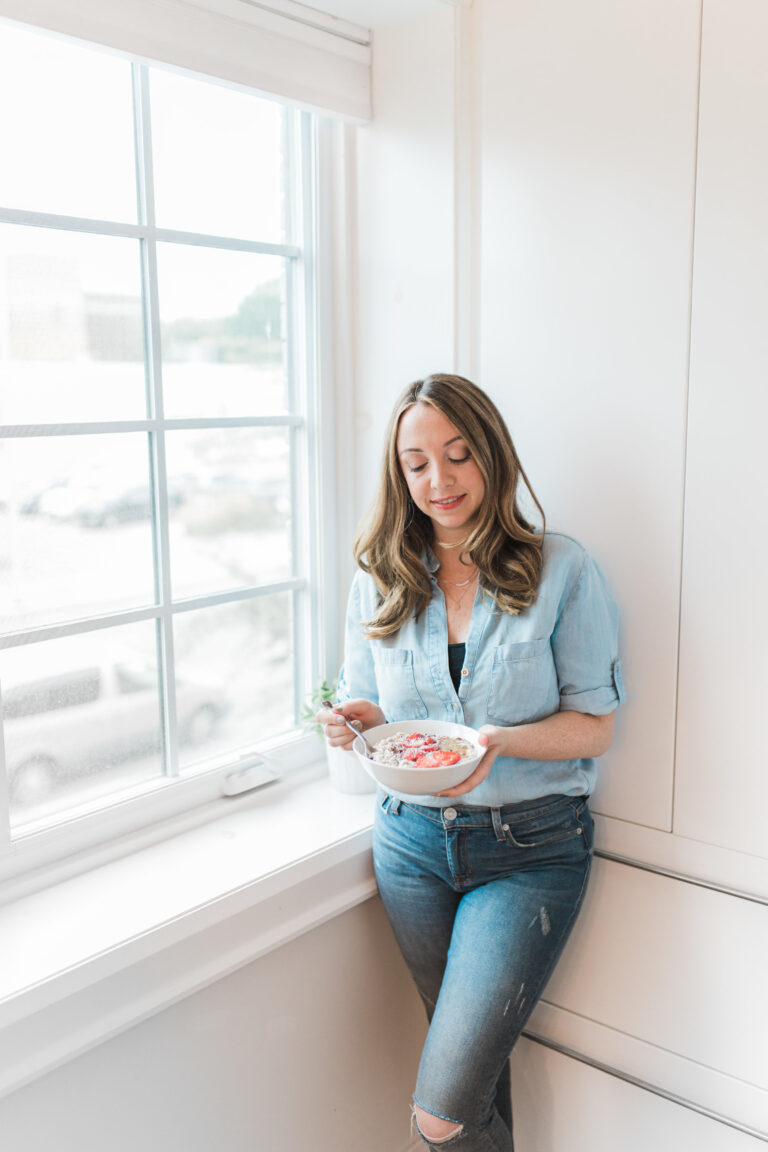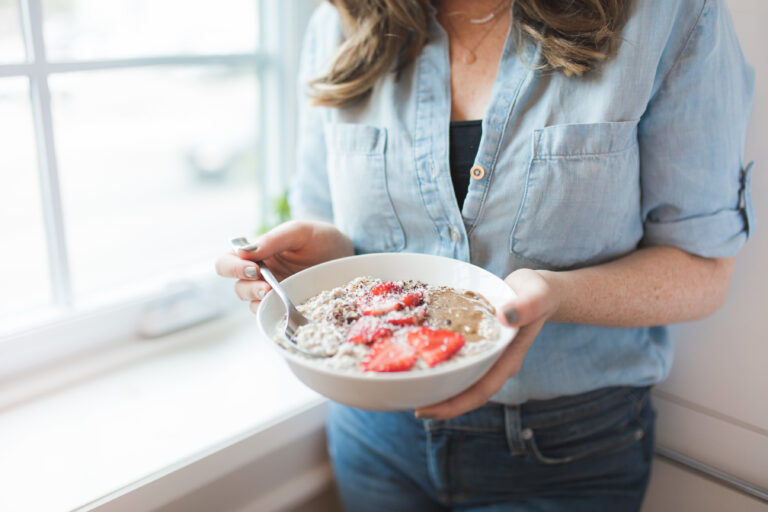What is Intuitive Eating: And How it Helped Me

I’ve been talking about intuitive eating for over a year now and I’ve written about it a lot over the year. But, it occurred to me that I have yet to delve deeper into what is intuitive eating. And so I wanted to share the basics of intuitive eating and also share how changing the way I eat and look at food changed my whole life.Growing up, I had a negative view of my body and food. But if I am being honest, it wasn’t even evident to me that things were messed up until very recently. I saw my mom constantly trying diet after diet, picking apart everything about her body and herself and always wishing away those stubborn pounds as if once they disappeared life could finally begin. I thought this kind of living was completely normal and something all women did. But it most definitely is not normal and your life doesn’t need to be dictated by food rules or obsession. I remember thinking what is intuitive eating all about when I first came across the concepts and thought there was no way that it was actually possible to live life this way. But it most definitely is something that can be learned, understood and most importantly- put into practice.
What is Intuitive Eating:
The term intuitive eating first came about in the late 1980s stemming from a movement toward a non-diet philosophy.
It became evident that dieting for the purpose of weight loss could only lead to failure, more weight gain, and lowered self esteem. The two authors of Intuitive Eating, both Registered Dieticians were the first dieticians to take this broad philosophy and lay down ten principles, named the principles of Intuitive Eating, which addressed how people could move away from diet thinking and move back toward their intuitive wisdom about eating. The original edition of Intuitive Eating was released in 1995, with a second edition in 2003, an audio book with guided practices for all of the Intuitive Eating principles in 2009, and now the 3rd edition in 2012. The term, “intuitive Eating” was coined by the authors. (source)
A very important note to make is that Intuitive Eating is an evidence-based mind-body health approach. It is comprised of 10 principles created byEvelyn Tribole and Elyse Resch. It has a validated assessment scale with over 90 studies to date! It is a personal process of honouring health by listening and responding to the direct messages of the body in order to meet your physical and psychological needs.To me, Intuitive Eating is a way of life. After dedicating myself to learning and most importantly implementing the 10 principles I was able to repair my relationship to food after about 6-9 months. I am eternally grateful to have found the information contained in the book (and workbook) and to the two amazing dieticians that helped make this movement possible.You can check out the book here and the workbook here.

The 10 Principles:
So what exactly are these ten principles all about? I am going to briefly explain what the principles are and how I’ve been able to incorporate them into my daily life.
Principle #1: Reject the Diet Mentality
This principle is all about unsubscribing from diet culture. That means ditching the belief that dieting is the way to live your life and the false hope that quick weight loss is possible. It usually means getting a little bit (or a lot) angry at the lies that have been fed to you about dieting. You know, the ones that make you feel like a failure every time you start a new diet and somehow aren’t able to measure up or succeed.For me this meant letting go of the idea that weight loss was somehow the be all and end all goal for health. You can read more about health and weight loss in this blog post. It took me a while to unlearn a lot of what I thought I knew about “healthy eating” and forced me to confront a lot of those lies stemming from diet culture. Things like cutting back on foods around certain life events (like going on vacation) so that I could look my “best”, eating only at certain times of the day (being scared to eat past 8pm) and pacifying my hunger by drinking tea or water rather than actually nourishing myself.
Principle #2: Honour Your Hunger
Learning to be ok with feeding and nourishing your body and getting comfortable with those first initial signs of hunger is a big one. Often times, we wait until we are near famished and then overeat. When you learn to be in tune with your body a bit more and eat when those initial signs start to pop up is key to help you in rebuilding your relationship to food.I often tried to squash my hunger by pacifying it so that I could go longer in between meals. I would feel bad if I ate too much in between my meals like somehow I was weak. Ignoring the signals of my hunger was not helping me in the long run and so it was important to take a step back, tune in and honour my hunger and fullness.
Principle #3: Make Peace with Food
Ultimately this principle is all about giving yourself unconditional permission to eat. When you tell yourself you shouldn’t have a certain food, subconsciously you are actually setting yourself up for feelings of deprivation, cravings and binges. When you allow yourself to eat all the foods, you remove a lot of the sexiness around that food, thus making you less likely to overeat and binge later on.I was probably most scared of this principle because I feared that if I let go of the apparent control I had around food I would end up eating everything. Here is the thing, in the beginning I did overeat, I allowed myself to eat foods that I had once deemed forbidden and went a little overboard. But, truly those thoughts faded and I was left feeling very unemotional about food. Food actually lost a little bit of its appeal. The novelty wore off and I become aware that there is plenty of food around, so the feeling to overeat dissipated.
Principle #4: Challenge the Food Police
That voice in your head that declares you are either a “good” or “bad” person based on what you eat is not your friend. Food doesn’t have a moral compass attached to it and eating a piece of cake doesn’t make you a bad person.The food police is something that gets stronger and stronger with each new diet you try. I was guilty of doing this a lot. I judged who I was as a person based on what was on my plate and worse, I did it to others as well. I didn’t do it out loud, but in my head, I did judge other people based on what they were eating.
Principle #5: Feel Your Fullness
Learning to listen to those cues from your body that tell you you’re full and no longer hungry is something that is often lost. There are many reasons it is lost which can be due to our busy lives and just not being connected to our bodies. When you first begin to notice those signs of fullness, it is important to notice them so that you can stop eating before becoming too full and possibly feeling sick. This isn’t a rule, like stop eating when your full, rather it is a cue to notice and helps you connect to your body on a deeper level.This was another important lesson for me to discover. It helped me to slow down when I was eating, and to begin to notice when I’ve had enough food. It’s ok to not eat everything on your plate (in fact its useful- hello leftovers) and it is also ok to have more food if you need it. The key thing it listening to your body and tuning in. Ultimately, I learned to listen and honour my fullness which led to a deeper respect for my body.

Principle #6: Discover the Satisfaction Factor
Dieting has definitely taken away the thought and feeling of satisfaction around food. Food is and should be a pleasurable experience. There is so much more to food than just macros, calories and nutrients. It also has the opportunity to bring people together, to create memories and to bring joy to our lives.I discovered that when I allowed myself to eat what I really wanted, no questions or judgement required, as I found more pleasure from food. It also meant that I ate less of it often times. Along with getting pleasure from food and realizing that it was a good thing, I also discovered the pleasure of eating in an environment that was conducive for me.
Principle #7: Cope with Your Emotions Without Using Food
One of the biggest a-ha moments happened when I realized that emotional eating was often a sign that something in my life required more of my attention. It meant that I was neglecting self-care practices and using food to cope with those unresolved emotions.It helped me realize that emotional eating wasn’t the problem. It was actually a gift that helped me to realize I turn to food as a way to cope with feelings and thoughts that actually needed my attention. When I realized this, it took away so much of the comfort I felt when I did eat emotionally and overeat and it helped me realize that I needed to make self-care a real priority.
Principle #8: Respect Your Body:
This principle is all about learning to accept your genetic blueprint. Not everyone is going to look like the images that you see online, in magazines or on TV and that is ok.I have always had a problem with the way my body looked from a young age. I fought the way my body was shaped through years of dieting, restriction and ultimately bingeing. When I stopped fighting my body, embraced intuitive eating and I noticed the first signs of my body changing, I felt discomfort. But I stayed on course and worked through those feelings. You can read more about self love after weight gain here.
Principle #9: Exercise- Feel the Difference
Shift your focus to how it feels to move your body rather than solely looking at it from a calorie burning or weight loss perspective.What I noticed while implementing this principle was that what I enjoyed from a workout is different that what someone else may enjoy and thats ok. For so long, I tried to just do the exercises that I thought I had to do to lose weight and tone up. The problem with that is that because I didn’t enjoy it, I didn’t do it. When I changed this to finding what I enjoyed, it helped me stick with it and not because I felt like I had to, but because I wanted to.
Principle #10: Honour Your Health- Gentle Nutrition
By leaving the nutrition portion until the end of the program, you realize that healing your relationship to food and your body truly is the most important thing.This taught me that one meal, one day of eating foods that aren’t as nutrient dense won’t make or break me. It isn’t an all or nothing thing when it comes to nutrition and it doesn’t need to be super serious either. What you eat consistently over time is truly what matters the most.

This post contains affiliate links, which means I may receive a small commission at no extra cost to you. I only share products and services I have personally used and love. Disclosure here.
I would love to hear about your thoughts on intuitive eating, what does it mean to you?






